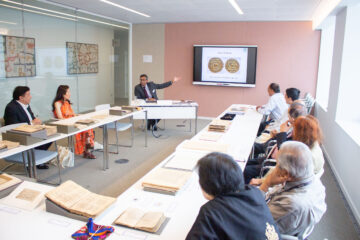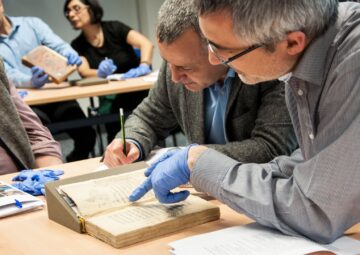Selection Criteria and Process
The Farhad Daftary Doctoral Scholarships are awarded according to the following criteria:
- Relevance of the topic to the core research areas of the IIS listed below and/or the areas of interest of AKDNThe Aga Khan Development Network (AKDN) is a contemporary endeavour of the Ismaili Imamat to realise the ethics and social conscience of Islam through institutional action. More and related institutions.
- Consonance with the IIS’s core areas and commitment to academic scholarship.
- Conceptual sophistication and intellectual depth and thoroughness.
- Analytical ability and methodological prowess.
- Proficient knowledge of existing literature.
- Clarity of thought and excellent writing abilities.
- Commitment to contributing to the IIS or its related institutions and constituencies.
Successful candidates are selected by the IIS Scholarships Committee. Applications are due by 31 March (every year). Application reviews usually take place in April. Shortlisted candidates may be called for an interview in late May. Candidates will receive notification of whether they have been successful by mid/late June. As a matter of policy, the Institute does not disclose reasons for rejecting an application.
Core Research Areas
There is great need of research by IIS in areas that are traditionally considered part of Islamic Studies. Among these, the most relevant to the Institute’s research needs are:
- Ismaili Studies, understood as covering any field and discipline that deals with the IsmailisAdherents of a branch of Shi’i Islam that considers Ismail, the eldest son of the Shi’i Imam Jaʿfar al-Ṣādiq (d. 765), as his successor., their history, philosophy and spirituality, built heritage, oral history, manuscript traditions, diaspora, devotional practices, as well as their situation in the contemporary world, including comparative studies with other communities.
- Wider Shi‘i Studies, including Shi‘i texts, history, theology and doctrines, theories of authority, law, philosophy or rituals.
- Qur’anic Studies, including studies on the Qur’an itself (its text, context, discourse or concepts), as well as studies on the reception of the Qur’an in various fields or linguistic regions, or the various interpretations of the Qur’an(also Koran. Arabic term meaning, ‘recitation’ or ‘scripture’): Muslims believe that the Holy Qur’an contains divine revelations to the Prophet Muhammed received in Mecca and Medina over a period of… More: the genre of tafsir (Qur’anic commentary), ta’wil (esoteric, philosophical or mystical interpretations), or any other forms of interpretation or applications of the Qur’an.
- Islamic Law, including ethics, bioethics, governance, the “pillars of Islam” (arkan), rituals, legal theory (usul al-fiqh), contemporary applications, responses to modernity, contemporary life-style issues, etc.
- Education, including curriculum planning and development; school curricula on Islam in Muslim educational systems; approaching Islam as a school subject; curricular change, innovation and implementation; curriculum evaluation; translation and adaptation of curriculum materials for diverse cultural contexts; the arts, humanities and sciences in education on Islam; pedagogies for value education; distance education, blended learning, etc.
- Manuscript Studies, including analysing, editing and translating texts from manuscripts related to various aspects of Islamic civilisation, particularly Ismaili history and its intellectual traditions as preserved through IIS manuscript collection or elsewhere.
In addition, the scholarships are also open to any areas in which Islam can be analysed in one of its various manifestations (historical, theological, philosophical, legal, educational, ritual, cultural, etc.) Research can be conducted from any of the various perspectives and disciplines related to the humanities, including, for instance, Anthropology and related disciplines, Arts and Material Culture, Digital Humanities, Education, Literature, Ethnomusicology, Philosophy, Political Science or Sociology. Applications focusing on historical studies, as well as those concentrating on contemporary studies, will also be considered. Research may be focused on any region of the Muslim world.



